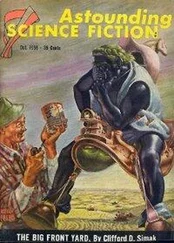Carson surged to his feet.
“Fennimore!” he shouted.
The man spun toward him, and for an instant the two stood facing one another in the flare of the gutted building.
Then Fennimore’s gun was coming up and to Carson it was almost as if he stood off to one side and watched with cold, deliberate, almost scientific interest.
But he knew his own hand was coming up, too, the left hand with the feel of the gun a bit unfamiliar in it.
Fennimore’s gun drooled fire and something brushed with a blast of air past Carson’s cheek. Then Carson’s gun bucked against his wrist, and bucked again.
On the rise of ground, in the dying light of the sinking fire, Fennimore doubled over slowly. And across the space of the few feet that separated them, Carson heard him coughing, coughs wrenched out of his chest. The man pitched slowly forward, crashed face-first into the grass.
Slowly, Carson turned and walked down to the street, his wounded arm hanging at his side, blood dripping from his dangling fingers.
The guns were quiet. The fire was dying down. Black, grotesque figures still lay huddled in the dust. In front of the Tribune office the horses milled, and inside the office someone had lighted a lamp.
Voices yelled at him as he stepped up on the board sidewalk and headed for the office. He recognized some of the voices. Owens, Kelton, Ross – the men who had ridden away the night before, afraid of what might happen to their homes.
Owens was striding down the walk to meet him. He stared at Carson’s bloody arm.
“Fennimore plugged me,” Carson said.
“Fennimore got away. He isn’t here.”
“He’s out back of the jail,” Carson told him.
“We’re glad we got here in time,” said Owens, gravely. “Glad we came to our senses. The boys feel pretty bad about last night. It took Miss Delavan to show us –”
“Miss Delavan?” asked Carson, dazed. “What did Kathryn have to do with it?”
Owens looked surprised. “I thought you knew. She rode out and told us.”
“But Fennimore had guards posted!”
“She outrode them,” Owens declared. “They didn’t shoot at her. Guess even a Fennimore gunman doesn’t like to gun a woman. They took out after her, but she was on that little Star horse of hers –”
“Yes, I know,” said Carson. “Star can outrun anything on four legs.”
“She told us how it was our chance to make a decent land out here, a decent place to live – a decent place for our kids.”
“Where is she now?” asked Carson. “You made her stay behind. You –”
Owens shook his head. “She wouldn’t listen to us. Nothing doing but she’d ride along with us. She said her father –”
“You left her at the house?”
Owens nodded. “She said –”
But Cason wasn’t listening. He wasn’t even staying. He stepped down into the street and walked away, his stride changing in a moment to a run.
“Kathryn!” he cried.
She was running down the street toward him, arms outstretched.
Jake, prodding Quinn and Clay Duffy toward the Tribune at rifle-point, saw them when they met. He watched interestedly, and spat judiciously in the dust.
“Beats all hell,” he told Quinn, “how that feller gets along with women.”
Originally published in Galaxy Science Fiction in May 1953, “Junkyard” fits neatly inside a particular subspecies of Simak stories – those starring what we might call “freebooters.” By this I mean stories in which human exploitation of the galaxy is being carried out not by human governmental agencies, but by the agents of commercial organizations, who are generally out to make a buck. In interstellar space, there are a lot of places a story with such a background can take you …
—dww
I
They had solved the mystery – with a guess, a very erudite and educated guess – but they didn’t know a thing, not a single thing, for certain. That wasn’t the way a planetary survey team usually did a job. Usually they nailed it down and wrung a lot of information out of it and could parade an impressive roll of facts. But here there was no actual, concrete fact beyond the one that would have been obvious to a twelve-year-old child.
Commander Ira Warren was worried about it. He said as much to Bat Ears Brady, ship’s cook and slightly disreputable pal of his younger days. The two of them had been planet-checking together for more than thirty years. While they stood at opposite poles on the table of organization, they were able to say to one another things they could not have said to any other man aboard the survey ship or have allowed another man to say to them.
“Bat Ears,” said Warren, “I’m just a little worried.”
“You’re always worried,” Bat Ears retorted. “That’s part of the job you have.”
“This junkyard business …”
“You wanted to get ahead,” said Bat Ears, “and I told you what would happen. I warned you you’d get yourself weighed down with worry and authority and pomp – pomp –”
“Pomposity?”
“That’s the word,” said Bat Ears. “That’s the word, exactly.”
“I’m not pompous,” Warren contradicted.
“No, you’re worried about his junkyard business. I got a bottle stowed away. How about a little drink?”
Warren waved away the thought. “Someday I’ll bust you wide open. Where you hide the stuff, I don’t know, but every trip we make …”
“Now, Ira! Don’t go losing your lousy temper.”
“Every trip we make, you carry enough dead weight of liquor to keep you annoyingly aglow for the entire cruise.”
“It’s baggage,” Bat Ears insisted. “A man is allowed some baggage weight. I don’t have hardly nothing else. I just bring along my drinking.”
“Someday,” said Warren savagely, “it’s going to get you booted off the ship about five light-years from nowhere.”
The threat was an old one. It failed to dismay Bat Ears.
“This worrying you’re doing,” Bat Ears said, “ain’t doing you no good.”
“But the survey team didn’t do the job,” objected Warren. “Don’t you see what this means? For the first time in more than a hundred years of survey, we’ve found what appears to be evidence that some other race than Man has achieved space flight. And we don’t know a thing about it. We should know. With all that junk out there, we’d ought to be able by this time to write a book about it.”
Bat Ears spat in contempt. “You mean them scientists of ours.”
The way he said “scientist” made it a dirty word.
“They’re good,” said Warren. “The very best there is.”
“Remember the old days, Ira?” asked Bat Ears. “When you was second looey and you used to come down and we’d have a drink together and …”
“That has nothing to do with it.”
“We had real men in them days. We’d get ourselves a club and go hunt us up some natives and beat a little sense into them and we’d get more facts in half a day than these scientists, with all their piddling around, will get in a month of Sundays.”
“This is slightly different,” Warren said. “There are no natives here.”
There wasn’t, as a matter of fact, much of anything on this particular planet. It was strictly a low-grade affair and it wouldn’t amount to much for another billion years. The survey, understandably, wasn’t too interested in planets that wouldn’t amount to much for another billion years.
Its surface was mostly rock outcroppings and tumbled boulder fields. In the last half million years or so, primal plants had gotten started and were doing well. Mosses and lichens crept into the crevices and crawled across the rocks, but aside from that there seemed to be no life. Although, strictly speaking, you couldn’t be positive, for no one had been interested in the planet. They hadn’t looked it over and they hadn’t searched for life; everyone had been too interested in the junkyard.
Читать дальше












